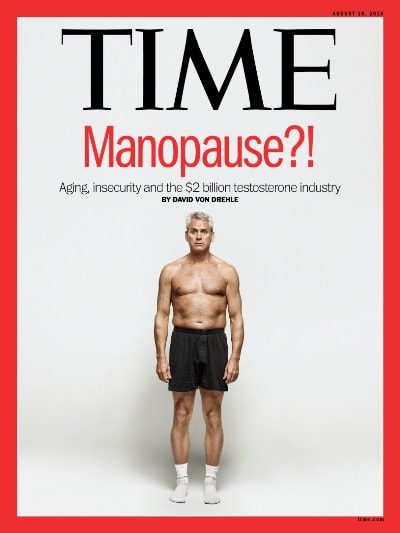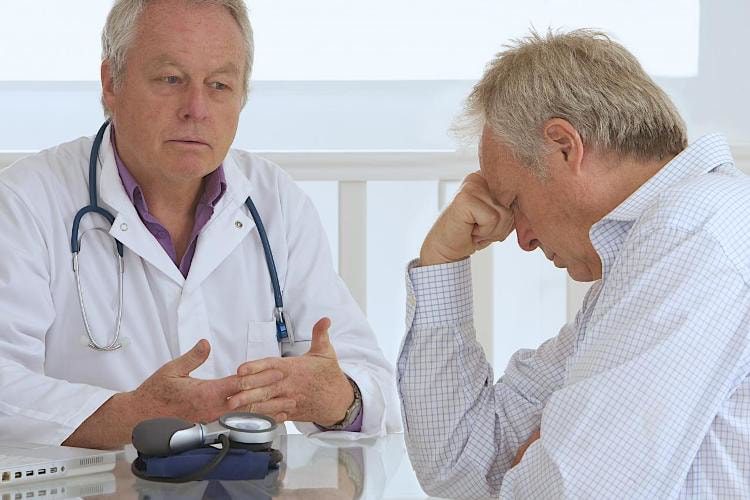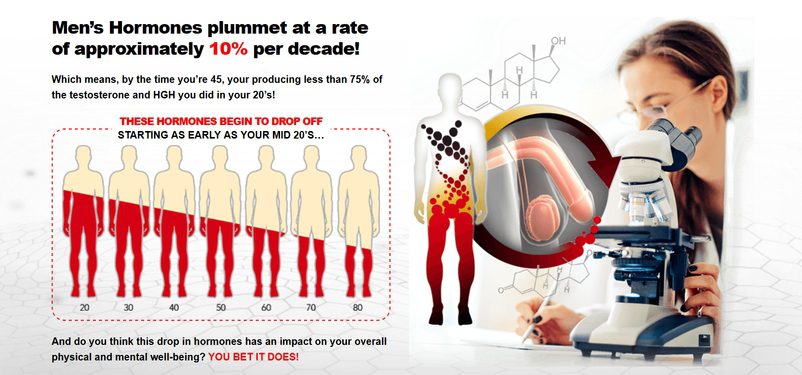Depression is one of the common andropause symptoms and is not gender specific! It can, and does, affect both men and women equally.
Depression has a dark side, particularly for men. According to the World Health Organization, just over 796,000 people committed suicide globally in 2018. This figure doesn’t include some physician-assisted suicides in those countries that have legalized it so the actual total is higher.
In the US alone over 50,000 people took their lives. The male suicide rate was 23.6 per 100,000 people whilst the female suicide rate was 7 per 100,000 people. In other words, nearly 4 times (3.68) as many American men committed suicide in 2018 than women, a figure that is comparable with the global figure of 3.6.

Alarming figures but in almost ALL countries the rate of male suicide is significantly higher than female suicides. In fact, there are only 8 countries in the world where more women, or an equal number of women, commit suicide. In some countries men are 9 times more likely than their female counterparts to suicide.
Whilst obviously not all males who are depressed commit suicide, depression nevertheless can and does have an overwhelming affect on their lives, and also on the lives of those around them. This is possibly because many men have a problem with reaching out to get help and advice. Admitting to a health issue as significant as depression is often seen as ‘unmanly’ and a weakness, as is getting help for it. So men continue to try and cope with the issue on their own as best they can, which may result in a downward health spiral that ultimately leads them to take what they see as the only solution.
Andropause And Male Depression
Depression is one of the common andropause symptoms. Andropause is the so-called male ‘mid life’ crisis equivalent of menopause for women. In reality though the two types of ‘mid-life crisis’ differ quite a bit. Menopause, as a normal part of the aging process, is something all women go through; it’s only the degree to which they’re affected that differs. Some women don’t have too many issues at all whilst other women suffer badly enough that they need hormone replacement therapy.
Andropause is the result of a gradual decline in testosterone production that begins around the age of 30 for many men. It can take decades to reach the point where testosterone production drops off enough to cause significant health issues that require andropause treatment. Some men never reach that point and continue to produce enough testosterone to maintain normal health right through until old age.
However, those men who do suffer a significant decline in testosterone production as they age typically develop andropause symptoms including:
- Erectile dysfunction
- Loss of libido
- Reduction in bone density
- Decreased muscle mass
- Increased fat buildup, particularly around the waist
- Problems sleeping properly
- Depression
- Extreme tiredness
- Mood swings
- Irritability
 Helpful Tips For Andropause And Depression
Helpful Tips For Andropause And Depression
If someone you know, or you yourself, are suffering from depression or other health issues that may be contributing to depression, here are some ways to help.
Know that bottling everything up inside is not a good idea. Find some way to effectively reduce the tension and frustration you may be feeling.
Don’t be afraid to talk to someone. A physician is an excellent start and will be able to help determine the underlying issues with a view to treating them. If you don’t want to talk about depression, and many men don’t, it may be easier to talk about more general andropause symptoms you’re experiencing – lethargy, no energy, poor sleep, and so on.
Keep active. There’s mounting evidence to suggest that obesity and depression often go hand in glove. Increased fat buildup is in fact one of the common andropause symptoms so making exercise a regular part of your routine is excellent andropause treatment for many reasons. It releases ‘feel good’ hormones in the brain that not only make you feel a lot better, but also help improve your sleep as well. The regular exercise will help keep you fit, reduce your stress levels, and you’ll look heaps better too.
A healthy diet is the basis for a healthy lifestyle. As well as eating a lot of fresh fruit and vegetables there are a number of foods that are useful andropause treatment for symptoms like depression. The list includes whole grains, oily fish, brown rice, and leafy veggies. Notably, oily fish is high in Eicosapentaenoic acid (EPA), an omega-3 fatty acid. Studies into EPA and depression have found that subjects taking fish oil high in EPA daily had reduced symptoms of depression such as suicidal thoughts, insomnia, and feeling hopeless.
Get rid of the processed foods, especially the ones that high in processed sugar and artificial trans fats. They’re also a major contributor to obesity. Excessive caffeine and alcohol consumption likewise are linked with worsening depression so avoid too much of those as well.
Consider enrolling in yoga, tai chi, and similar classes that teach techniques for relaxation. They’re also great exercise. Massages and aromatherapy are another way of helping yourself de-stress. Studies have shown that lemon oil in particular is a highly effective anti-depressant and can ease stress.
Get enough sleep. Between 7 and 8 hours a night is recommended. This may be easier said than done because insomnia is one of the most common symptoms of depression but there are a few things you can do to help. Cool dark bedrooms are more conducive for sleeping. Be sure not to drink anything stimulating like caffeine within a few hours of bedtime. Learn relaxing techniques – deep breathing is one.
There are also a few foods that are helpful if eaten just before bedtime. Consider a pre bedtime snack of chicken, turkey or fatty fish, have a handful of walnuts and almonds, drink some chamomile or passionflower tea, eat a banana and kiwi fruit salad topped with yogurt and honey, or try a more savory snack of eggs and kale. These foods all naturally increase production of tryptophan and melatonin, the sleep hormones.
Find something you enjoy doing and get into the habit of doing it regularly. If it involves fresh air, sunshine, and exercise, so much the better but really, anything that absorbs your interest and takes your mind off your problems will help.
Take a good look at your life. Chances are you’re a perfectionist. Many men with ongoing depression are, and the perception that they’re not living up to their expectations of themselves contributes to their depression and feelings of inadequacy. Take steps to reduce your expectations, or your workload, or even consider a new career direction that is less demanding.
Take a break. Vary your routine. Go on a holiday. Anything that breaks up your normal routine for a bit can be an effective andropause treatment for symptoms like depression.
Ask your physician about human growth hormones. Some of the health issues caused by inadequate human growth hormone production are similar to andropause symptoms, notably depression and anxiety, fat build up around the waist, and tiredness. Therefore, HGH may be an effective andropause treatment for your depression as well.
Every healthy male will experience a decrease in the production of testosterone, the “male” hormone, as he ages.
This decline in testosterone is gradual, spanning ten to fifteen years on average. While the gradual decrease of testosterone does not display the profound effects that a woman’s menopause does, the end results are similar. They are lethargy (feeling that you have no energy), loss of muscle mass and strength, increased fat and loss of libido (sexual drive). Until recently, this male phenomenon has been virtually ignored. The onset of symptoms is gradual and can be vague, and therefore can be easily missed.
This page was designed to help you deal with, and feel good about your andropause and to explain the physical and psychological changes you’ll experience. It will also provide you with different options to avoid or alleviate problems and describe medical treatment that may be needed.

WHEN DOES ANDROPAUSE OCCUR?
When levels of testosterone fall, the condition is known as hypogonadism (hypo = low), (gonad = testis or ovary).
There Are Two Types Of Hypogonadism: Primary And Secondary
- Primary hypogonadism – when the Leydig cells in the testes have lost the capacity to secrete testosterone at normal, youthful levels.
- Secondary hypogonadism – when the messages from the brain to the pituitary gland are not strong enough or frequent enough to stimulate the Leydig cells to secrete testosterone.
If testosterone levels are normal, and a man is experiencing signs of andropause, the hormonal culprit is usually estrogen, the female hormone. Both men and women must have a specific ratio of testosterone to estrogen. Young men may have a ratio of testosterone to estrogen of 50:1. The ratio drops to 20:1 or even as low as 8:1 with normal aging. When estrogen levels in a man increase, the effects of testosterone are negated. While estrogens in women protect them from heart disease and osteoporosis, the effects are the opposite for men. Too much estrogen will actually increase the risk of heart attacks in men.
How Does Estrogen Occur In A Man’s Body?
Within the body, there is an enzyme called aromatase. It converts certain amounts of testosterone into estradiol (an estrogen). With aging, a man’s body will produce larger amounts of aromatase. Larger amounts of aromatase mean more conversion of testosterone to estradiol. This will change the ratio of testosterone to estrogen. A man may have a normal testosterone level, but with an increased estrogen level, the effects of the testosterone are negated. The transformation is not difficult, as the chemical makeup of testosterone and estrogen is very similar.
How Do Levels Of Estrogen Become Elevated?
- Obesity Studies indicate that obesity is directly related to over-estrogenization in both sexes. All fat cells contain aromatase, so an increase in fat cell population will cause an increase in the conversion of testosterone into estrogen. This will alter the testosterone:estrogen ratios. Obesity is also known to lower testosterone levels at all ages. This may be an excellent reason to trim down and tone up!
- Zinc Deficiency Zinc inhibits the levels of aromatase in the body. If zinc levels are inadequate, the levels of aromatase rise. Zinc is also necessary for normal pituitary functions. Without zinc, the pituitary gland cannot release the luteinizing and follicle stimulating hormones that stimulate the testes to produce testosterone. An interesting note; while zinc is necessary for testosterone production, testosterone is necessary to maintain levels of zinc in body tissues.
- Liver Function One of the functions of the liver, is to aid in the elimination of chemicals, hormones, drugs and metabolic waste products from the body. There are a number of factors that will prevent or decrease this from happening. Use of alcohol will diminish liver function. Normal aging will also lessen liver function.
- Alcohol As previously stated, alcohol intake will assist with diminished liver function, and the elimination of excess hormones, drugs and metabolic wastes. Alcohol consumption causes dramatic rises in estrogen levels in the body. Women will have a dramatic rise in their estrogen levels after just one drink. Men will not have a dramatic rise, but levels of estrogen will increase. Heavy drinkers will have high estrogen levels, along with other related symptoms, such as “spider veins”, especially on the nose and cheeks, gynecomastia (development of breasts) and testicular atrophy (degeneration or shrinking). Alcohol decreases zinc levels in the body.
- Prescription Drugs The side effects of some prescription drugs will have a negative effect on the body, and increase the effects of andropause. One example is diuretics (water pills such as Lasix). While necessary to treat conditions such as high blood pressure, the action of the diuretic will diminish levels of zinc in the body. To counteract the effects of the diuretic, a zinc supplement should be taken.

Testosterone In Your Body
Testosterone can be either free or bound within the body. Bound testosterone is not available for use, as it is bound to other substances throughout the body. Most of a man’s testosterone is bound. The remaining testosterone is called free or bioavailable testosterone. Normal levels of testosterone are between 350 – 1000 ng/dl (nanograms per deciliter). Of this, 97 – 98 percent is bound. Most of the binding occurs to a sex hormone-binding globulin (SHBG). The amounts of SHBG within the blood increase with age. The SHBG traps much of the circulating bioavailable testosterone, making it unavailable to exert its effects on the body. It is the bioavailable testosterone that promotes strength in the muscles and maintains or increases muscle mass, libido and sexual performance. It also improves quality of sleep, increases mental and physical energy, and also promotes improvements in mood and the sense of well-being. Testosterone also plays a role in synthesizing proteins. It affects many metabolic activities, such as the production of blood cells in the bone marrow, formation of bone, lipid (fat) and carbohydrate metabolism and growth of the prostate gland.
SYMPTOMS
- Depression
Androgen deficiency can affect cognitive functions, resulting in lack of mental energy, decreased sense of well-being and depression. - Fatigue
Androgen deficiency causes loss of muscle mass, tone and bone density. These losses can leave an andropausal man with feelings of fatigue. - Irritability
Androgen deficiency can also heighten feelings of irritability that can lead to aggression, hostility, and anger. - Reduced Libido
Androgen deficiency reduces libido (the desire for sex). For most men, sexual changes and loss of libido occur gradually. - Aches & Pains
Because of muscle mass depletion, men will often experience a multitude of generalized aches and pains throughout their bodies. - Sweating & Flushing
As with women, the fluctuating levels of hormones can cause periods of diffuse sweating and hot flashes. - Decreased Sexual Performance Or Erectile Dysfunction
The inability to obtain and maintain an erection is known as impotence. Erectile dysfunctions also include prolonged length of time in achieving an erection, diminished force and volume of ejaculation, diminished rigidity of the erection and diminished pleasure. Most men who reach midlife will experience one or all of these to varying degrees. Most young men do not experience impotence. Sexual change can be the precursor or warning of other disease processes, such as coronary artery disease and diabetes.
SHORT-TERM EFFECTS
- Decreased strength
- Decreased endurance
- Dermatological changes
- Decreased libido
- Decreased sexual performance
- Dysphoria (restlessness)
- Fatigue
- Loss of self-esteem
- Increased anxiety
Common Changes That Are Manifested In Andropause Include:
- A decline in physical energy
- Difficulty in concentration
- Forgetfulness
- Insomnia
- Altered state of well-being
LONG-TERM EFFECTS
The long-term effects of hypogonadotropinism include:
- Osteoporosis
- Obesity
- Erectile dysfunction
- Muscle loss
Osteoporosis
In healthy individuals, bone tissue is constantly being broken down and rebuilt. People who have osteoporosis do not rebuild bone tissue as fast as it is broken down. Bone density in men between the ages of 40 to 70 decreases by up to 15%. This is a concern, as a person with low bone density is at risk for bone fractures. Common fracture sites are the hips, wrists, spine and ribs.
Testosterone affects many metabolic functions within the body. It assists with the production of blood cells in the bone marrow, as well as bone production. Decreasing levels of testosterone play a role in diminished bone rejuvenation and diminished production of blood cells.
With advancing age and declining testosterone levels, a man’s risk level is similar to women. One in eight men over the age of fifty has osteoporosis.
Who will develop osteoporosis cannot be predetermined, but there are risk factors that will predispose a person to developing osteoporosis. The risks include:
- Age
- Low testosterone levels
- Family history of osteoporosis
- Thin and/or small frame
- Use of corticosteroids, anticonvulsants or drugs used to combat tissue rejection
- Excessive alcohol consumption
- Smoking
- Lack of weight-bearing exercise
How Do You Find Out If You Are In Andropause?
The only way to find out for sure, is to have a blood test that measures the bioavailable testosterone. The best time for this test is in the morning, due to the night and day cycle peaks of testosterone.
TREATMENTS
Traditional Therapies
There are two different types of preparations of testosterone available in Canada:
- Injectable
- Testosterone cypionate
(Depo-Testosterone Cypionate) - Testosterone enanthate
(Delatestryl)
- Testosterone cypionate
The injectable testosterone is usually given intramuscularly (a needle) every two weeks.
- Oral
- Testosterone undecanoate
(Andriol)
- Testosterone undecanoate
The oral testosterone is taken daily.


 Helpful Tips For Andropause And Depression
Helpful Tips For Andropause And Depression


